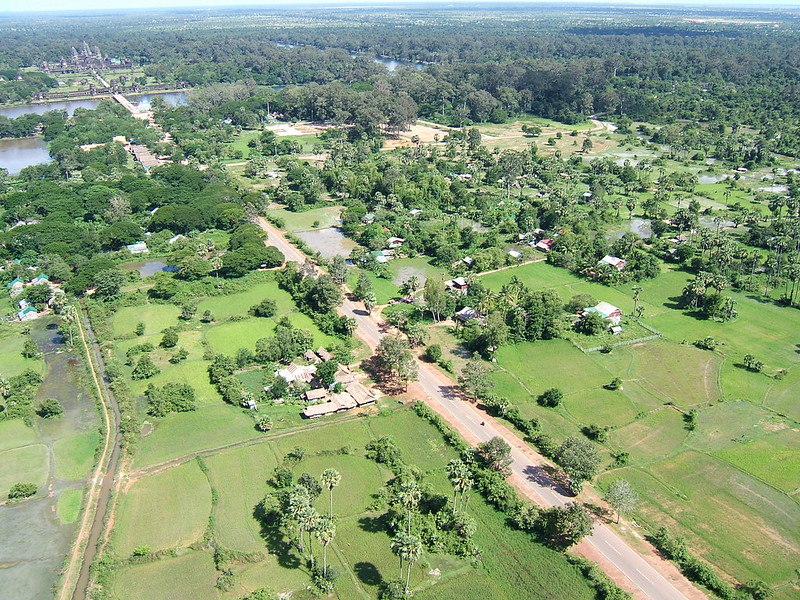
ទេសភាពស្រុកស្រែបៃតងខ្ចីនៅជុំវិញប្រាសាទអង្គរវត្ដ ប្រទេសកម្ពុជា។ រូបភាព ថតដោយ shankar s. កាលពីខែតុលាឆ្នាំ២០០៨។ ក្រោមអាជ្ញាប័ណ្ណ CC BY 2.0.
ច្បាប់ភូមិបាលឆ្នាំ ២០០១ បានបង្កើតប្រព័ន្ធបែងចែកប្រភេទដីនៅកម្ពុជា។ ដី នៅប្រទេសកម្ពុជា ត្រូវបានចាត់ថ្នាក់ជាបីប្រភេទ៖ ដីឯកជន ដីសាធារណៈរបស់រដ្ឋ និងដីឯកជនរបស់រដ្ឋ។
ដីឯកជន
ដីឯកជន គឺជាអចលនវត្ថុដែលជាកម្មសិទ្ធិស្របច្បាប់របស់បុគ្គលតែម្នាក់ ឬជាសមូហភាពរបស់បុគ្គល ឬក្រុមហ៊ុន។1 ទោះបីមានការធានា និងការពារដោយរដ្ឋធម្មនុញ្ញឆ្នាំ ១៩៩៣ និងច្បាប់ភូមិបាលឆ្នាំ ២០០១ អង្គការមិនមែនរដ្ឋាភិបាល និងប្រព័ន្ធផ្សព្ធផ្សាយ បានរាយការណ៍ថា ម្ចាស់កម្មសិទ្ធិអចលនវត្ថុឯកជននៅកម្ពុជានៅតែប្រឈមនឹងអសន្តិសុខកម្មសិទ្ធិដីធ្លី ក្រោមរូបភាពជា ការបណ្តេញចេញដោយបង្ខំ ការលក់ដោយបង្ខំ និងជម្លោះដីធ្លីជាមួយនីតិបុគ្គលឯកជន។2
ដីរដ្ឋ៖ ដីសាធារណៈ និងឯកជន
ដីសាធារណៈរបស់រដ្ឋ សំដៅទៅរាល់ដីទាំងឡាយណា ដែលបម្រើឱ្យផលប្រយោជន៍សាធារណៈ។ ទាំងនេះ រាប់បញ្ចូលទាំង៖ ដីដែលមានប្រភពពីធម្មជាតិ(ដូចជា ទន្លេ បឹងបួរ និងភ្នំ) អចលនវត្ថុដែលត្រូវបានអភិវឌ្ឍជាពិសេសសម្រាប់ការប្រើប្រាស់ទូទៅ (ដូចជា កំពង់ផែ ផ្លូវដែក និងព្រលានយន្តហោះ) អចលនវត្ថុសម្រាប់ការប្រើប្រាស់ជាសាធារណៈ (ដូចជា ផ្លូវថ្នល់ ផ្លូវលំ និងសួនច្បារសាធារណៈ) អចលនវត្ថុដែលត្រូវបានបែងចែកដើម្បីផ្តល់សេវាសាធារណៈ (ដូចជា សាលារៀន មន្ទីរពេទ្យ និងអគាររដ្ឋបាល) តំបន់ការពារ តំបន់បេតិកភ័ណ្ឌ និងប្រវត្តិសាស្ត្រ និងទ្រព្យសម្បត្តិផ្លូវការរបស់ខ្សែព្រះរាជ្យវង្ស ។3
ដីឯកជនរបស់រដ្ឋ គឺជារាល់អចលនវត្ថុទាំងឡាយណាដែលជាកម្មសិទ្ធិរបស់រដ្ឋ ប៉ុន្តែ មិនបម្រើឲ្យផលប្រយោជន៍សាធារណៈ (ដូចជា មិនស្ថិតក្នុងប្រភេទណាមួយដែលមានកំណត់ខាងលើ) ។4 ដីប្រភេទនេះ អាចយកទៅ លក់ ឬ ជួល រាប់បញ្ចូលទាំងការជួលរយៈពេលវែង និង សម្បទានដី ប៉ុន្តែរាល់ការផ្ទេរសិទ្ធិ ត្រូវ គោរពតាមនីតិវិធីច្បាប់។5 ការបែងចែករវាង ដីសាធារណៈរបស់រដ្ឋ និងដីឯកជនរបស់រដ្ឋ គឺចាំបាច់ ព្រោះវាជះឥទ្ធិពលលើរបៀបប្រើប្រាស់ និងគ្រប់គ្រងដីនោះ។
ដីសាធារណៈរដ្ឋមិនអាចលក់ ឬផ្ទេរ និងមិនអាចផ្តល់ឲ្យជាសម្បទានដីសេដ្ឋកិច្ច ឬសង្គមកិច្ច ឡើយ។ ទោះជាដូច្នេះ អង្គការមិនមែនរដ្ឋាភិបាល រាយការណ៍ថា ដីសាធារណៈរបស់រដ្ឋជាច្រើន រួមទាំង ដីក្នុងតំបន់ការពារ ត្រូវបានធ្វើចំណាត់ថ្នាក់ជាថ្មី ជាដីឯកជនរបស់រដ្ឋ និងផ្តល់ជាដីសម្បទានដល់នីតិបុគ្គលឯកជន ។6 រាល់ការគ្រប់គ្រងដីសាធារណៈរបស់រដ្ឋ អាចប្រឈមនឹងការដាក់ទណ្ឌកម្ម ជាការផាកពិន័យ ឬផ្តន្ទាទោសដាក់ពន្ធនាគារ ។7 ទោះបីយ៉ាងណា ដីនេះអាចជួលបានក្នុងរយៈពេលមិនលើសពី ១៥ ឆ្នាំឡើយ ដរាបណារាល់សកម្មភាពលើដីសាធារណៈរបស់រដ្ឋ មិនធ្វើឱ្យផ្លាស់ប្តូរលក្ខណៈនៃដី ឬធ្វើឲ្យដីនោះស្ថិតក្នុងលក្ខខណ្ឌដែលតម្លៃប្រយោជន៍សាធារណៈត្រូវបានបាត់បង់ ។8 ដីឯកជនរបស់រដ្ឋ អាចជាកម្មវត្ថុនៃការលក់ ការដូរ ការផ្ទេរ និងការជួល ដូចជា ការជួលរយៈពេលវែង និងសម្បទានដី ។9 ប្រសិនបើដីសាធារណៈរបស់រដ្ឋបាត់បង់តម្លៃខាងបម្រើបម្រាស់ដល់ផលប្រយោជន៍សាធារណៈ វាអាចនឹងត្រូវបានចាត់ថ្នាក់ឡើងវិញជាដីឯកជនរបស់រដ្ឋ ដូចនេះវាអាចយកមកជួល ធ្វើសម្បទាន ដោះដូរ ឬលក់បាន ។10
ដីសមូហភាព
នៅប្រទេសកម្ពុជា សិទ្ធិលើដីសមូហភាព មានច្រើនសណ្ឋាន ហើយសិទ្ធិរបស់សហគមន៍ជនជាតិដើម ត្រូវបានគេស្គាល់ច្រើន។ ជាមួយនឹងអត្តសញ្ញាណខាងវប្បធម៌ផ្សេងៗពីគ្នា សហគមន៍ជនជាតិដើមនៅប្រទេសកម្ពុជា មានចំណងខាងវប្បធម៌ សាសនា និងសេដ្ឋកិច្ចយ៉ាងស្អិតរមួត ទៅនឹងដី។ បើទោះបីជា រាជរដ្ឋាភិបាលកម្ពុជា ទទួលស្គាលសិទ្ធិលើដីសហគមន៍ បែបបទនៃការធានាការគោរពសិទ្ធិទាំងនេះ សម្រាប់សហគមន៍ជនជាតិដើម នៅមានសភាពយឺតយ៉ាវ។11 អង្គការមិនមែនរដ្ឋាភិបាល បានអះអាងថា វឌ្ឍនភាពលើកិច្ចការនេះ បានធ្វើឱ្យប៉ះពាល់លើដីធ្លី និងធនធានធម្មជាតិ។12
យោងទៅតាមច្បាប់ភូមិបាលឆ្នាំ២០០១ កម្មសិទ្ធិសហគមន៍ ឬសមូហភាព មានពីរប្រភេទ៖ អចលនវត្ថុរបស់វត្តអារាម និងអចលនទ្រព្យសហគមន៍ជនជាតិដើម។ អចលនទ្រព្យរបស់វត្តអារាម រួមមានដី និងរចនាសម្ព័ន្ធ នៅក្នុងវត្តព្រះពុទ្ធសាសនា ដែលជាកម្មសិទ្ធិរបស់សាសនាព្រះពុទ្ធ។13អចលនទ្រព្យនេះ មិនអាចយកទៅលក់ ផ្លាស់ប្តូរ ឬធ្វើជាអំណោយ ព្រមទាំងមិនអាចកាន់កាប់ឱ្យស្របច្បាប់ ដោយបុគ្គលផ្សេងបានឡើយ។ ទោះបីយ៉ាងណា ដីនេះ អាចយកទៅជួល ឬចែករំលែកកសិផល ក្នុងករណីដែល ចំណូលបានមកនោះ ត្រូវបានប្រើប្រាស់តែសម្រាប់ទិសដៅខាងសាសនា។14
សម្រាប់ព័ត៌មានបន្ថែមស្តីពីដីសហគមន៍ សូមចូលទៅកាន់ទំព័រស្តីពី ដីសមូហភាព។
ទាក់ទងនឹងការធ្វើចំណាត់ថ្នាក់ដី
បច្ចុប្បន្នភាពចុងក្រោយ ថ្ងៃទី ៧ ខែសីហា ឆ្នាំ២០១៥
ឯកសារយោង
- 1. ច្បាប់ភូមិបាល ឆ្នាំ ២០០១ មាត្រា ១០។
- 2. លីកាដូ. ២០១៥. សេចក្តីថ្លែងការណ៍៖ ការងើបឡើងជាថ្មីនៃជម្លោះដីធ្លី គួរត្រូវដោះ ស្រាយ ចៀសជាងបដិសេធ ថ្ងៃទី ១៩ ខែកុម្ភៈ. http://www.licadho-cambodia.org/pressrelease.php?perm=374;&khmer ។ ការិយាល័យឧត្តមស្នងការអង្គការសហប្រជាជាតិទទួលបន្ទុកសិទ្ធិមនុស្ស. ឆ្នាំ២០១២. “ការបណ្តេញចេញ និងការតាំងលំនៅជាថ្មី នៅកម្ពុជា៖ “តម្លៃមនុស្ស ផលប៉ះពាល់ និងដំណោះស្រាយ.” ឆ្នាំ២០១២. http://cambodia.ohchr.org/WebDOCs/DocProgrammes/Resettlement_Study-28_Feb_2012_Eng.pdf ។ ម៉ៃ ទិត្យថារ៉ា. “អ្នកភូមិ៖ ក្រុមហ៊ុនអភិវឌ្ឍសហភាព ដាក់ចេញការគម្រាមបណ្តេញចេញជាថ្មី.” ភ្នំពេញ ប៉ុស្តិ៍ ថ្ងៃទី ២១ ខែមេសា ឆ្នាំ២០១៥. http://www.phnompenhpost.com/national/udg-issuing-eviction-threats-again-villagers។
- 3. ច្បាប់ភូមិបាល ឆ្នាំ២០០១ មាត្រា១៥។ អនុក្រឹត្យលេខ ១៨ ស្តីពីការគ្រប់គ្រងដីរដ្ឋ (ឆ្នាំ២០០៥) មាត្រា៤។
- 4. អនុក្រឹត្យលេខ ១១៨ ស្តីពីការគ្រប់គ្រងដីរដ្ឋ មាត្រា៥។
- 5. ច្បាប់ភូមិបាល (ឆ្នាំ២០០១) មាត្រា១៧។
- 6. អាដហុក. ឆ្នាំ២០១៣. “ចំណុចរបត់? ៖ សិទ្ធិដីធ្លីលំនៅដ្ឋាន និងធនធានធម្មជាតិនៅកម្ពុជា ឆ្នាំ ២០១២.” http://www.nachdenkseiten.de/upload/pdf/ADHOC-A_Turning_Point_Land_Housing_NRM_2012.pdf ។ មជ្ឈមណ្ឌលសិទ្ធិមនុស្សកម្ពុជា (២០១៣). “កម្ពុជា ៖ ជម្លោះដីធ្លី-ទិដ្ឋភាពទូទៅនៃស្ថានភាពដីធ្លី.” bit.ly/1KtPNVy
- 7. ច្បាប់ភូមិបាល (ឆ្នាំ២០០១) មាត្រា១៦ និង មាត្រា២៥៩។
- 8. អនុក្រឹត្យលេខ ១២៩ ស្តីពីវិធាន និងនីតិវិធីនៃការធ្វើចំណាត់ថ្នាក់ឡើងវិញលើកម្មសិទ្ធិសាធារណៈរបស់រដ្ឋ និងនីតិបុគ្គលសាធារណៈ (ឆ្នាំ២០០៦) មាត្រា១៨ និងមាត្រា១៦។
- 9. ច្បាប់ភូមិបាល ឆ្នាំ២០១១ មាត្រា១៧។
- 10. អនុក្រឹត្យលេខ ១២៩ ស្តីពីវិធាន និងនីតិវិធីនៃការធ្វើចំណាត់ថ្នាក់ឡើងវិញលើកម្មសិទ្ធិសាធារណៈរបស់រដ្ឋ និងនីតិបុគ្គលសាធារណៈ (ឆ្នាំ២០០៦) ជំពូកទី៦។
- 11. លុច ម៉ូនីកា. ឆ្នាំ២០១៣.”ការវាយតម្លៃសិទ្ធិមនុស្សលើគម្រោងសិទ្ធិដីធ្លីអាឡឺម៉ង់-កម្ពុជា.” វិទ្យាស្ថានអាឡឺម៉ង់ដើម្បីសិទ្ធិមនុស្ស. https://landportal.org/library/resources/mlrf2186/human-rights-assessment-german-cambodian-land-rights-program-lrp ។
- 12. សម្រាប់ជាឧទាហរណ៍ មើល មជ្ឈមណ្ឌលសិទ្ធិមនុស្សកម្ពុជា (២០១៣). “កម្ពុជា ៖ ជម្លោះដីធ្លី-ទិដ្ឋភាពទូទៅនៃស្ថានភាពដីធ្លី.” http://bit.ly/1KtPNVy ។
- 13. ច្បាប់ភូមិបាល (ឆ្នាំ២០១១) មាត្រា២០។
- 14. ច្បាប់ភូមិបាល (ឆ្នាំ២០០១) មាត្រា២១។

